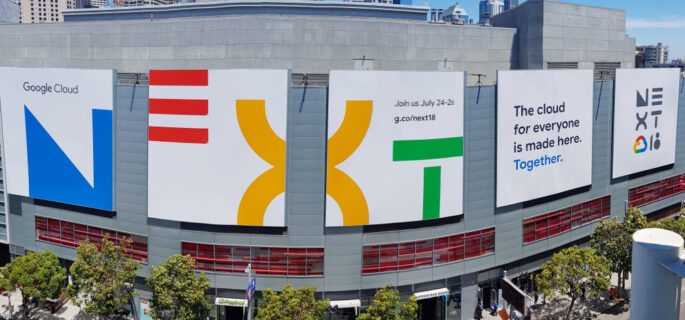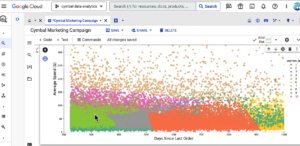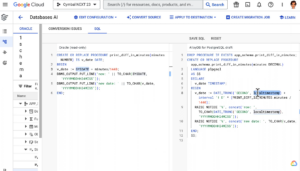Duet AI Goes Everywhere in Google’s Cloud

Google Cloud Next in San Francisco in 2018 (behindlens/Shutterstock)
Google Cloud introduced several more uses for Duet AI, the AI interface unveiled earlier this year. Data engineers will be singing duets with integrations for BigQuery, AlloyDB, and Cloud Spanner, while data analysts will be in ML harmony with a new Looker integration. Duet AI is also being integrated across Google’s expansive Workspace properties, providing a productivity boost for millions of office workers.
Google Cloud officially unveiled Duet AI in May as a large langauge model (LLM)-based triple threat that can assist with development, assist with data anslysis, and assist with operations. The offering, which is still in beta, has been accessible to users via a pane found in the Google Cloud console and via IDEs. With today’s announcements, made on the first day of the Google Cloud Next conference that’s expected to attract 20,000 people to San Francisco, it’s now being expanded to work with a variety of other Google Cloud products, starting with Workspace.
Duet AI in Workspace
With 3 billion users, Google Workspace is one of the most popular products of all time. And now with Duet AI coming into the picture, the 10 million or so paying Workspace customers are getting access to some of the most advanced technology.
Google Cloud says Duet AI will act as your meeting assistant in Workspace, capturing notes and action items, and even taking video snippets in real time. Can’t make a meeting because you’re double booked? Don’t stress – just send your robot double, Duet AI, as your stand-in, where it will give you a summary of the meeting and even ask a question on your behalf.
“We’re fundamentally reshaping AI’s role as your collaborative partner across Workspace, putting Duet AI’s capabilities at the forefront of everything you do,” Kristina Behr, the vice president of products for Google Workspace, said in a press conference last week. “Our technology has always made it incredibly easy to collaborate in real time with other people. Now with Duet AI you can collaborate just as easily in real time with AI.”
Duet AI in GCP
There are two main roles for Duet AI in GCP, including helping developers with code completion and software development lifecycle tasks, and helping with administrative tasks on GCP infrastructure.
Duet AI for GCP is a specialized model that’s trained and tuned to the GCP context, Gerrit Kazmaier, Google Cloud’s vice president and general manager of databases, data analytics, and Looker, said in a press conference last week. “For instance, like generating and publishing an API or doing source citation,” he says. “It generates code for you, writing and providing test coverage.”
Duet AI for Looker allows users to “chat with their enterprise data,” Kazmaier said, including asking the AI to generate a report, dashboard, or text summaries for them. Duet AI for Looker also understands the customers’ data model, he said.
Duet AI for BigQuery functions as an AI assistant for data engineers. It can write code in Python, for example, enabling engineers to do more thinking about their data work and less actual coding. (For the record Duet AI speaks 22 languages, from Bash to YAML, according to this Google page.)
“Duet AI goes one step further than that,” Kazmaier said. “It can basically understand the data that you have access to, and it understands how the data is being used, so it can propose to you ways how you can analyze the data, which is very powerful because it can lead you to insights that you aren’t looking for in the first place.”
It’s important to understand the interaction between AI systems like Duet and data, Kazmaier said. “When you say ‘Bringing AI to data,’ you actually have to come up one big step,” he says. “It’s about understanding that every AI project is a data project in disguise, because you have to bring your enterprise data to the AI system.”
Google Cloud is also launching BigQuery Studio, which is a workbench that enables data and AI users to “collaboratively and collectively run the entire end-to-end chain, from data to AI activation,” he said.
Duet AI for Databases
Duet is also helping to move customer databases into the Google Cloud as part of the Database Migration Service (DMS). The AI operator will be called upon to write custom bits of SQL that can’t be automatically generated as customers move from the Oracle database to AlloyDB; support for Cloud SQL (Postgres) will be rolled out later this year.
“While we can do most of the code conversion completely automatically, there’s always going to be a few things we can’t do, so we’re using GenAI to help customer get over that last mile of code conversion,” Andi Gutmans, Google Cloud’s VP and GM of databases, said in a press conference last week.
A vector database is a key component of a GenAI application, and now you can get that capability in Alloy DB AI, which was also unveiled today. Gutmans described AlloyDB AI as “an integrated set of capabilities for easily building enterprise GenAI applications.”
In addition to delivering vector searches that are 10x faster than standard Postgres, AlloyDB AI will also “allow developers to easily generate vector embedding right from within the database, really making that developer experience simple and agile,” Gutmans said.
Duet AI is also being used with Cloud Spanner, the globally resilient SQL database service managed by Google Cloud. With Duet AI in Cloud Spanner, users can “generate code to structure, modify, or query your data using natural language,” the company said in a blog post today. “For instance, with a simple command such as ‘write a query to show all data in the messages table.’”
Duet AI for Security
Finally, Duet is also coming to Google Cloud’s security offerings, where it can function as a force multiplier for harried security teams.
“I’ve never met a CISOs who says they have enough talent and the people on their team,” Jeff Reed, Google Cloud vice president of products for security, said in a press conference last week. “GenAI offer a lot of opportunity to help scale talent. Level one operators can be as productive as level two and level three [operators].”
Specifically, Google Cloud is leveraging the Duet technology as well as Google’s PaLM large language model to bolster productivity to teams. The Google Cloud security team built their own custom model based on PaLM, called SecPaLM 2, and combined it with the interactive chat capabilites of Duet within Mandiant Threat Intelligence, the security research and services company it acquired a year ago for $5.4 billion.
“The beauty of Mandiant Threat Intelligence is you get some of the absolutely best threat intelligence in the world,” Reed said. “What we’ve done is we enable the Mandiant Threat Intelligence to be summarized using DuetAI so you can quickly use DuetAI to look at thousands of Mandiant finished intelligence report, summarize that for what’s most specific to you, and customize it to the type of audience.”
A Duet AI interface has also being created for Chronicle Security Operations, the company’s cloud-native security information and event management (SIEM) offering, which is designed to correlate petabytes of customer telemetry data with the latest security intelligence. Duet AI enables users to query Chronicle Security Operations using natural language, and also to provide summaries.
Duet AI remains in preview. You can sign up for it at cloud.google.com/duet-ai.
Related Items:
Google Cloud Levels Up Database Services with Cloud SQL Enterprise Plus
Google Cloud Bolsters Data, Analytics, and AI Offerings
Google Cloud’s 2023 Data and AI Trends Report Reveals a Changing Landscape
Related
Alex Woodie has written about IT as a technology journalist for more than a decade. He brings extensive experience from the IBM midrange marketplace, including topics such as servers, ERP applications, programming, databases, security, high availability, storage, business intelligence, cloud, and mobile enablement. He resides in the San Diego area.












